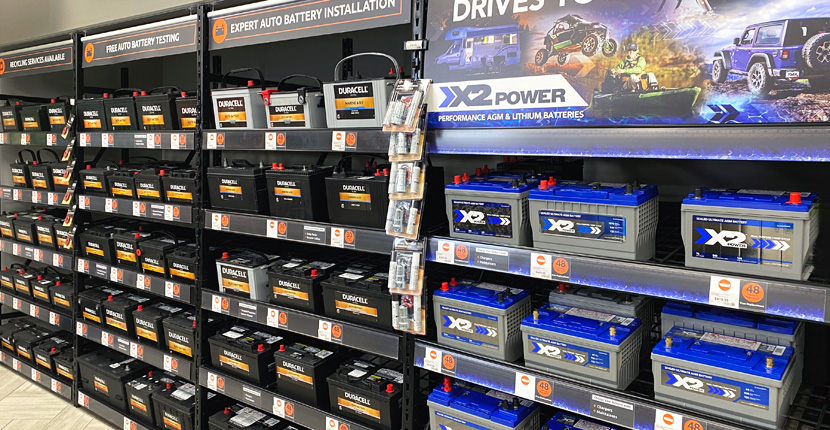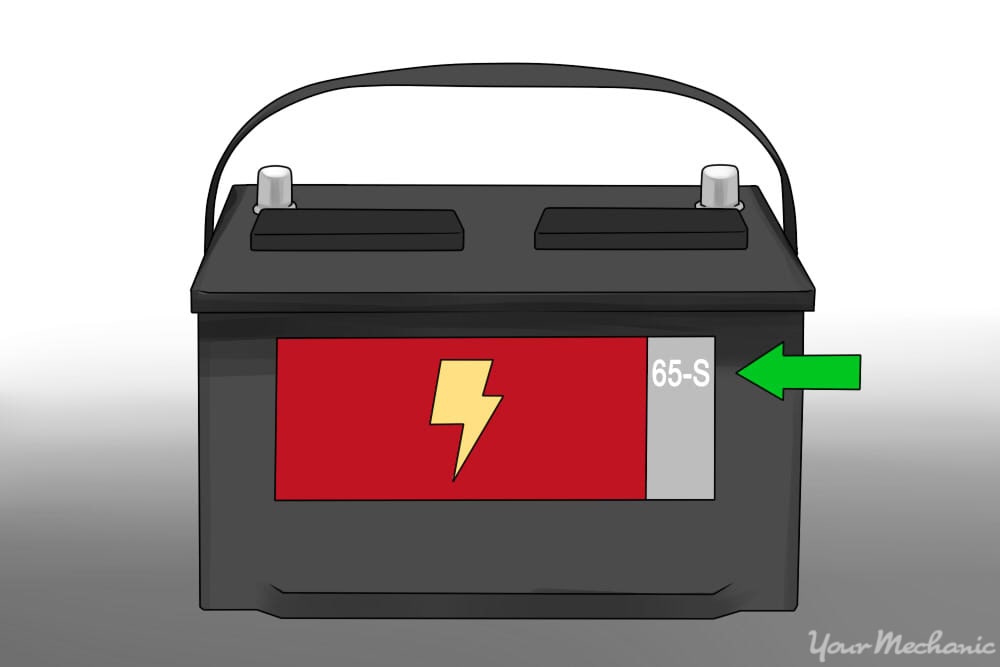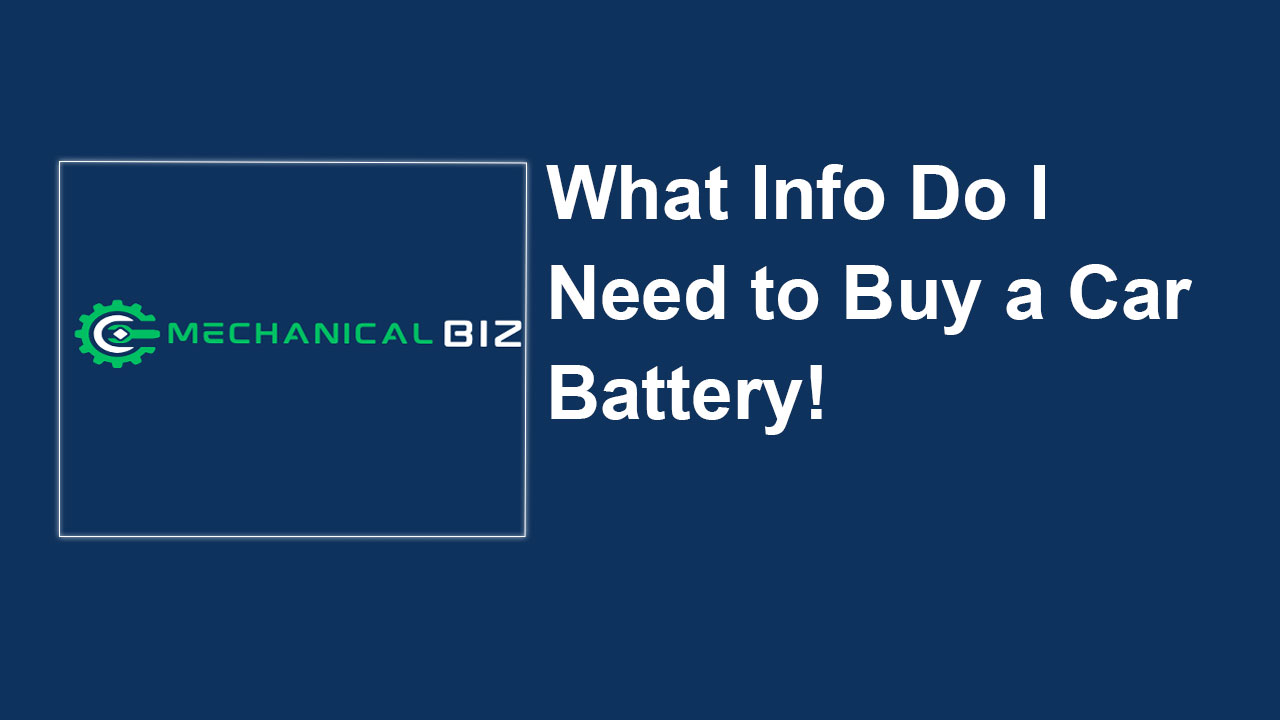To buy a car battery, you need the correct battery group size, cold cranking amps (CCA), and terminal configuration. Check your vehicle’s manual for specific requirements.
Purchasing a car battery can feel overwhelming due to the various options available. Understanding your vehicle’s specific needs is crucial for selecting the right battery. Factors such as battery size, cold cranking amps, and terminal placement can greatly affect performance.
The right battery ensures smooth starts and overall vehicle reliability. Always refer to your owner’s manual for specific recommendations tailored to your make and model. Checking the warranty and brand reputation can also guide your decision. This guide will help you navigate the essentials for buying a car battery effectively and confidently.

Credit: www.batteriesplus.com
Identifying Your Car’s Needs
Choosing the right car battery is crucial for your vehicle’s performance. Every car has unique requirements. Understanding these needs helps you select the perfect battery. This section covers how to identify your car’s specific needs.
Checking The Owner’s Manual
Your owner’s manual is an essential resource. It contains vital information about your car’s battery specifications. Always refer to it before making a purchase.
- Locate the battery section in the manual.
- Check the recommended battery type.
- Note the group size and dimensions.
This information ensures you choose a compatible battery. A battery that fits perfectly will enhance performance. It also avoids potential electrical issues.
Understanding Vehicle Specifications
Vehicle specifications vary by make and model. Key factors include:
| Specification | Description |
|---|---|
| Group Size | Matches the physical dimensions and terminal locations. |
| Cold Cranking Amps (CCA) | Indicates starting power in cold weather. |
| Reserve Capacity (RC) | Measures how long the battery can run without the engine. |
| Type | Lead-acid, AGM, or lithium-ion options. |
Understanding these specifications helps you choose wisely. A battery with the right specifications ensures smooth operation.
Check your vehicle’s specifications regularly. This practice helps maintain optimal battery performance.
Battery Group Size Matters
Choosing the right battery group size is crucial. This size affects how well your battery fits and performs. A proper fit ensures your car runs smoothly. Using the right size boosts your vehicle’s efficiency.
How To Determine The Right Size
Finding the correct battery group size is simple. Follow these steps:
- Check your vehicle’s owner manual.
- Look for the section on battery specifications.
- Find the battery group size listed there.
You can also check the current battery. The group size is often printed on the top or side. Use this information to guide your purchase.
Consequences Of Incorrect Battery Size
Using the wrong battery size can lead to problems:
- Poor Fit: A battery that doesn’t fit securely can move. This movement can damage your vehicle.
- Electrical Issues: Incorrect terminal placement can cause connections to fail.
- Reduced Performance: A mismatched battery may not provide enough power.
- Shortened Lifespan: Stress on the battery can lead to early failure.
Always ensure the battery group size matches your vehicle’s requirements. This small detail can save you money and hassle.
Cold-cranking Amps (cca) Explained
Choosing a car battery requires understanding some key terms. One of the most important is Cold-Cranking Amps (CCA). This measurement helps determine a battery’s performance in cold weather. Knowing CCA ensures your vehicle starts easily, even in low temperatures.
What Is Cca?
Cold-Cranking Amps (CCA) measures a battery’s ability to start an engine in cold conditions. Specifically, it represents how many amps a battery can deliver at 0°F (-18°C) for 30 seconds while maintaining at least 7.2 volts.
A higher CCA rating means better performance in cold weather. For example:
| Temperature | CCA Needed |
|---|---|
| Above 32°F (0°C) | 300-400 CCA |
| 20°F (-6°C) | 400-500 CCA |
| 0°F (-18°C) | 600 CCA or more |
Matching Cca To Your Climate
- Cold climates: Choose batteries with higher CCA ratings.
- Moderate climates: Average CCA ratings will suffice.
- Warm climates: Lower CCA ratings may be acceptable.
Follow these steps to match CCA to your needs:
- Check your local climate conditions.
- Refer to your vehicle’s owner’s manual for CCA recommendations.
- Consider how often you drive in extreme temperatures.
- Consult with a battery expert if unsure.
Understanding CCA helps you choose the right battery. This ensures reliable vehicle performance, especially in cold weather.
“`

Credit: www.yourmechanic.com
Battery Types And Their Applications
Choosing the right battery is essential for your vehicle’s performance. Different types of batteries serve various applications. Understanding these types helps in making an informed decision. Below are the common battery types and their uses.
Lead-acid Versus Lithium-ion
Lead-acid batteries are the traditional choice. They are affordable and widely available. These batteries work well for starting engines. They also perform well in vehicles with low power needs.
- Pros:
- Lower cost
- Reliable for starting engines
- Easy to recycle
- Cons:
- Heavier than lithium-ion
- Shorter lifespan
- Less efficient in extreme temperatures
Lithium-ion batteries are gaining popularity. They are lightweight and offer higher energy density. These batteries are often used in electric vehicles (EVs). They provide longer life and faster charging.
- Pros:
- Lightweight
- Longer lifespan
- Fast charging
- Cons:
- Higher cost
- Requires special handling
- Less recyclable
Specialty Batteries For Unique Needs
Some vehicles require specialty batteries. These include batteries for hybrid cars, start-stop systems, and more. Each type serves a specific function.
| Battery Type | Application | Key Features |
|---|---|---|
| Absorbent Glass Mat (AGM) | High-performance vehicles | Vibration-resistant, maintenance-free |
| Gel Cell | Deep cycle applications | Sealed, low self-discharge |
| NiMH (Nickel-Metal Hydride) | Hybrid vehicles | Good for power and efficiency |
Understanding battery types helps in selecting the right one. Choose wisely based on your vehicle’s needs.
Brand And Warranty Considerations
Choosing the right car battery involves careful thought about brand and warranty options. A reliable brand ensures quality and performance. A solid warranty provides peace of mind. Let’s explore the top battery brands and understand warranty options available.
Top Battery Brands
Several brands dominate the car battery market. Each brand offers unique features and benefits. Here are some of the most trusted names:
| Brand | Key Features |
|---|---|
| Optima | High performance, durable, and resistant to vibrations. |
| Interstate | Excellent cold-cranking amps, reliable in extreme weather. |
| DieHard | Long-lasting, strong starting power, trusted reputation. |
| AC Delco | Good value, OEM quality, various models for different needs. |
| Exide | Wide range of batteries, affordable options, reliable performance. |
Understanding Warranty Options
A warranty can save you money. It protects you against defects and failures. Here’s what to consider:
- Length of warranty: Look for at least a 3-year warranty.
- Free replacement period: Check how long you can exchange.
- Pro-rated warranty: Understand how depreciation affects coverage.
Most brands offer various warranty types. Always read the fine print. Know what is covered and for how long. A good warranty can make a big difference.
Installation Essentials
Installing a new car battery involves several important steps. Knowing what you need can simplify the process. Gather the right tools and decide if you’ll handle it yourself or hire a professional.
Tools You’ll Need
Here’s a list of essential tools for battery installation:
- Socket Wrench: Have several sizes available.
- Cleaning Towels: Keep your work area tidy.
- Carbon Wire Brush: Useful for cleaning terminals.
- Battery Terminal Puller: Optional but helpful.
Diy Versus Professional Installation
Deciding between DIY and professional installation is crucial. Each option has its pros and cons.
| Option | Pros | Cons |
|---|---|---|
| DIY Installation |
|
|
| Professional Installation |
|
|
Weigh your options carefully. Choose what suits you best.
Maintaining Your New Battery
Keeping your car battery in top condition is crucial. A well-maintained battery lasts longer and performs better. Regular maintenance prevents unexpected failures and keeps your car running smoothly.
Regular Checks For Optimal Performance
Perform simple checks to ensure your battery works well. Here are some essential tasks:
- Inspect terminals: Look for corrosion or loose connections.
- Check fluid levels: Ensure electrolyte levels are adequate.
- Test voltage: Use a multimeter to check battery voltage.
- Clean the battery: Remove dirt and debris from the surface.
Consider these frequency guidelines for checks:
| Task | Frequency |
|---|---|
| Visual inspection | Monthly |
| Fluid level check | Every 3 months |
| Voltage test | Every 6 months |
| Professional check | Annually |
When To Consider A Replacement
Knowing when to replace your battery can save you trouble. Watch for these signs:
- Slow engine crank: Difficulty starting your car.
- Dashboard warning light: Battery or check engine lights appear.
- Swollen battery case: Physical damage to the battery.
- Old age: Batteries typically last 3 to 5 years.
Evaluate your battery’s health regularly. Early detection of issues extends battery life.

Credit: resource-center.meineke.com
Where To Buy Your Car Battery
Choosing the right place to buy your car battery is essential. You have two main options: local retailers and online stores. Each has its advantages and disadvantages.
Local Versus Online Retailers
Local retailers offer several benefits:
- Immediate Availability: You can get the battery right away.
- Expert Assistance: Staff can help you choose the right battery.
- Installation Services: Many shops offer installation on-site.
Online retailers also have their perks:
- Wider Selection: You can find various brands and types.
- Convenient Shopping: Shop from the comfort of your home.
- Price Comparison: Easily compare prices across multiple websites.
Consider your needs. Do you need the battery quickly, or can you wait for shipping?
Evaluating Customer Service And Return Policies
Good customer service makes a big difference. Look for the following:
- Responsiveness: Are they quick to answer your questions?
- Knowledgeable Staff: Do they know about car batteries?
- Installation Help: Do they assist with installation?
Return policies are also important:
| Store Type | Return Period | Restocking Fee |
|---|---|---|
| Local Retailers | 30 Days | None |
| Online Retailers | 60 Days | 10% |
Check these details before making a purchase. A flexible return policy can save you money.
Frequently Asked Questions
Can I Just Buy Any Car Battery?
No, you cannot just buy any car battery. Car batteries vary by size, type, and specifications. Always check your vehicle’s manual for the correct battery requirements. Choosing the right battery ensures optimal performance and compatibility with your car.
What Is Needed For Car Batteries?
Car batteries need specific requirements for optimal performance. Ensure the correct size, terminal placement, and cold-cranking amps match your vehicle’s specifications. Choose a reliable brand and check the warranty. Regular maintenance, like cleaning terminals, also helps extend battery life. Always consult your owner’s manual for precise details.
What Do I Need To Install A New Car Battery?
To install a new car battery, gather these tools: a socket wrench, cleaning towels, and a carbon wire brush. A battery terminal puller is optional. Ensure you have the correct replacement battery for your vehicle’s specifications. Always wear safety gear during installation.
What Matters When Getting A Car Battery?
Choose a car battery that fits your vehicle’s specifications. Check the size, cold-cranking amps, and terminal placement. Consider the brand and warranty for reliability. Always consult your owner’s manual for compatibility. Proper fit ensures optimal performance and longevity.
What Specifications Do I Need For A Car Battery?
Know your car’s make, model, and year to find the right specifications for battery size and power requirements.
Conclusion
Buying a car battery requires careful consideration of several factors. Gather essential information like size, power requirements, and brand reputation. Understanding these details ensures you choose the right battery for your vehicle. Armed with the right knowledge, you can confidently make a purchase that meets your car’s needs.
Happy driving!

